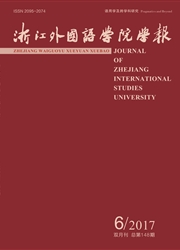
欢迎您!东篱公司
退出

 中文摘要:
中文摘要:
文章以《墨子》在历时语境中的两种复译本为例,从传播学五要素,即主体、内容、受众、媒介与效果等方面探析中外复译者在话语权建构策略上的异同及深层次原因。综合考虑译者话语权建构的效果及影响来评价典籍复译,为当下国学典籍的海外英译提供启示与借鉴。
 英文摘要:
英文摘要:
Based on a detailed analysis of two retranslations of Mozi, the retranslators'discourse power constructing strategies are expounded from the five aspects of subject, content, medium, audience and effect to explore their special effect and underlying reasons, which can provide insights for the current "going out" of Chinese classics.
 同期刊论文项目
同期刊论文项目
 同项目期刊论文
同项目期刊论文
 期刊信息
期刊信息
